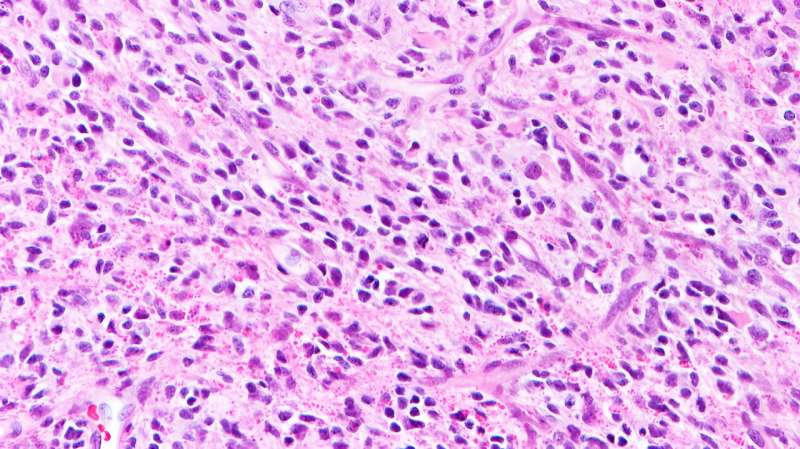This article has been reviewed according to Science X's editorial process and policies. Editors have highlighted the following attributes while ensuring the content's credibility:
fact-checked
trusted source
proofread
Potential new drug could target rare childhood brain tumor

Ribociclib—a drug already used to treat breast cancer—may help slow the growth of diffuse hemispheric glioma (DHG), new research has found.
A team of scientists from The Institute of Cancer Research, London and the Dana-Farber Cancer Institute, Boston, U.S., uncovered clues about the growth of a specific type of DHG—DHG, H3G34-mutant—which allowed them to explore new targeted treatments.
Diffuse hemispheric glioma is a rare, high-grade childhood brain tumor with a prognosis of 18–22 months; there is currently no cure. It is estimated that more than 30% of all pediatric high-grade glioma diagnoses are the DHG-H3G34 variant.
Laboratory tests and pre-clinical models led the researchers to discover that tumor cells disrupt the normal development of neurons, causing them to look like immature early neuron-like cells.
Searching for novel treatments
Exploring what would make these cells vulnerable to novel treatments found that targeting the protein CDK6, which is involved in regulating cell division, could prove promising. Abnormal activity in the CDK6 protein can lead to uncontrolled cell division—a hallmark of cancer.
Ribociclib is a CDK4/6 inhibitor approved to treat breast cancer, but in this study, it was used to treat a child with a brain tumor when other treatments failed. Treatment resulted in stable disease for a further 17 months until it started to grow back.
These very early results are remarkable given the typically poor prognosis for children diagnosed with these aggressive brain tumors.
The child is currently undergoing further treatment, more than four years since her diagnosis.
Clinical trials on the horizon
While ribociclib is not a cure for this devastating brain tumor, these findings are significant because the disease typically progresses within 3.5 months following recurrence.
There are hopes that this research could pave the way for clinical trials, as this was a preliminary test in just one child.
This research also showed that DHG-H3G34 tumors are more responsive to CDK4/CDK6 inhibitors than other high-grade glioma types—opening the door for more targeted treatments for this genetically distinct tumor type.
CDK4/6 inhibitors could be used in a combination treatment strategy
As CDK4/6 inhibitors slow the growth of tumor cells and do not kill them, this would not be a standalone treatment and therefore combination therapies need to be explored.
Professor Chris Jones, Professor of Childhood Brain Tumor Biology at The Institute of Cancer Research, London, said, "This work shows the importance of understanding how brain tumors develop in order to figure out better ways to treat these patients.
"It was a surprise to realize that this type of glioma seemed to arise from developing neurons, but we were able to use this knowledge to find specific vulnerabilities in these cancer cells, which hopefully we can now translate into clinical trials."
Mariella G. Filbin, MD, Ph.D., Co-Director of the Pediatric Neuro-Oncology Program at Dana-Farber Cancer Institute, said, "Our trans-Atlantic collaboration helped tremendously in validating and expanding our results, and I am thrilled to see our work translate into helping a patient so quickly.
"This is the first time we found functional consequences of aberrant lineage specification in tumor cells—a result that was unexpected at first, but is now setting the stage for new therapeutic avenues in this disease."
Dr. Simon Newman, Chief Scientific Officer at The Brain Tumor Charity said, "This research helps us have a better understanding of what is driving this devastating disease in children.
"We know that current treatments are not effective and that finding vulnerabilities in cancer cells could lead to new targeted treatments to help children live longer and better lives. Although this is very early days, we hope that it will provide some data to inform clinical trials in the future."


















